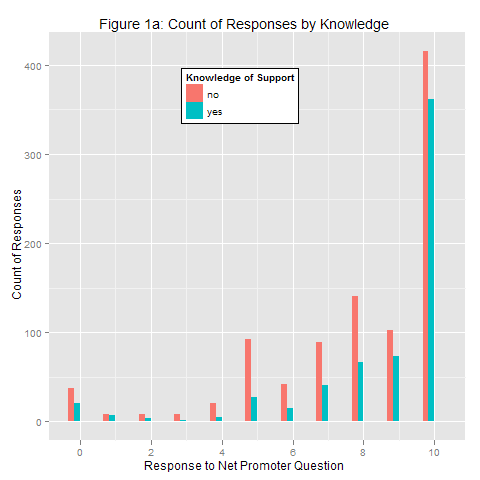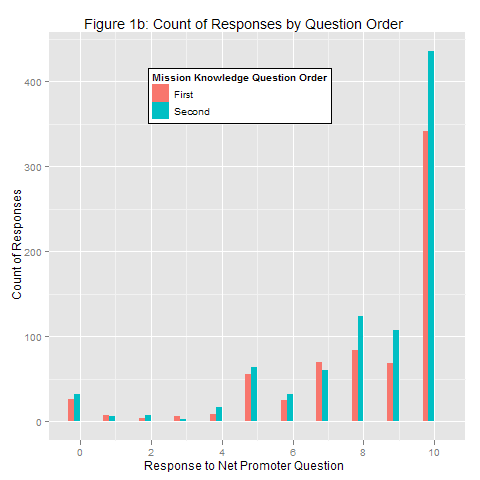Market research has shown that the Mozilla mission is a powerful attractor for Firefox users. Furthermore, additional research has shown that recommendation is a strong method to promote the adoption of Firefox.
These observations lead to the following question: how does one’s willingness to recommend Firefox relate to their knowledge that Firefox is made by Mozilla, a mission-driven non-profit? As an initial hypothesis, we posited that one’s willingness to recommend Firefox would be positively related to their knowledge of Firefox as a product of a mission-driven non-profit.
Using the beta survey interface, we asked Firefox 3.6 users the following questions:
- Did you know that by using Firefox, you are supporting a mission-driven non-profit organization?
- How likely are you to recommend Firefox to a friend or colleague? (0-10)
The response scale for question 2 was then used to calculate a Net Promoter Score (NPS), which is a marketing metric to gauge users’ willingness to recommend a product or service. A person who responds at 6 or lower is considered a “detractor,” whereas one who says “9” or “10” is considered a promoter. All else are considered “neutral.”
We calculate an NPS by subtracting the proportion of detractors from the proportion of promoters. Thus, scores are between 0 and 1 and higher is better. By using this metric, we are able to investigate the relationship between the knowledge that Firefox is made by a mission-driven non-profit and one’s willingness to recommend Firefox to others.
As a survey experiment, we also reversed the presentation of the questions, meaning that for some of the time, we asked respondents to give their willingness to recommend before they indicated whether they knew Firefox was made by a mission-driven non-profit. We did this in order to determine if simply informing users of this fact was enough to induce a “knowledge” effect.
Figure 1a shows that over every level of response, there are more users who say they did not know that Firefox was produced by a mission-driven non-profit than those who say they did. In particular, the amount of “neutrals” (which can be interpreted as the 5s, since it is the midpoint) is greater in the “without knowledge” group than in the “with knowledge” group. These data lend some credibility to the idea that knowing Firefox is made by a mission-driven non-profit relates to willingness to recommend and that more people are unaware of this fact than those who are.
Figure 1b shows the initial results of the question ordering. By asking users to indicate knowledge first, it appears to reduce the amount of 8s, 9s, and 10s from users. A potential explanation of this effect could be that users can tell that we are trying to induce positive feelings towards Firefox by asking them this information first. We can interpret these data to indicate that simply telling users that Firefox is made by a mission-driven non-profit is not enough to boost their willingness to promote.
Figure 2 demonstrates the relationship of willingness to recommend by knowledge group. This effect is quite pronounced. The NPS of these groups (“Yes, I did know” versus “No, I didn’t know”) are different from each other, where those with knowledge are much more likely to say that they are willing to recommend Firefox to others.
These results support our initial hypothesis: one’s willingness to recommend Firefox is positively related to one’s knowledge that Firefox is made by a mission-driven non-profit. Note that this is not a causal relationship; from this data, we cannot say that knowledge directly boosts one’s willingness to recommend Firefox. No statistical tests of inference have been performed. However, this survey study strongly indicates that this relationship bears further investigation.



salbano wrote on
:
wrote on
: